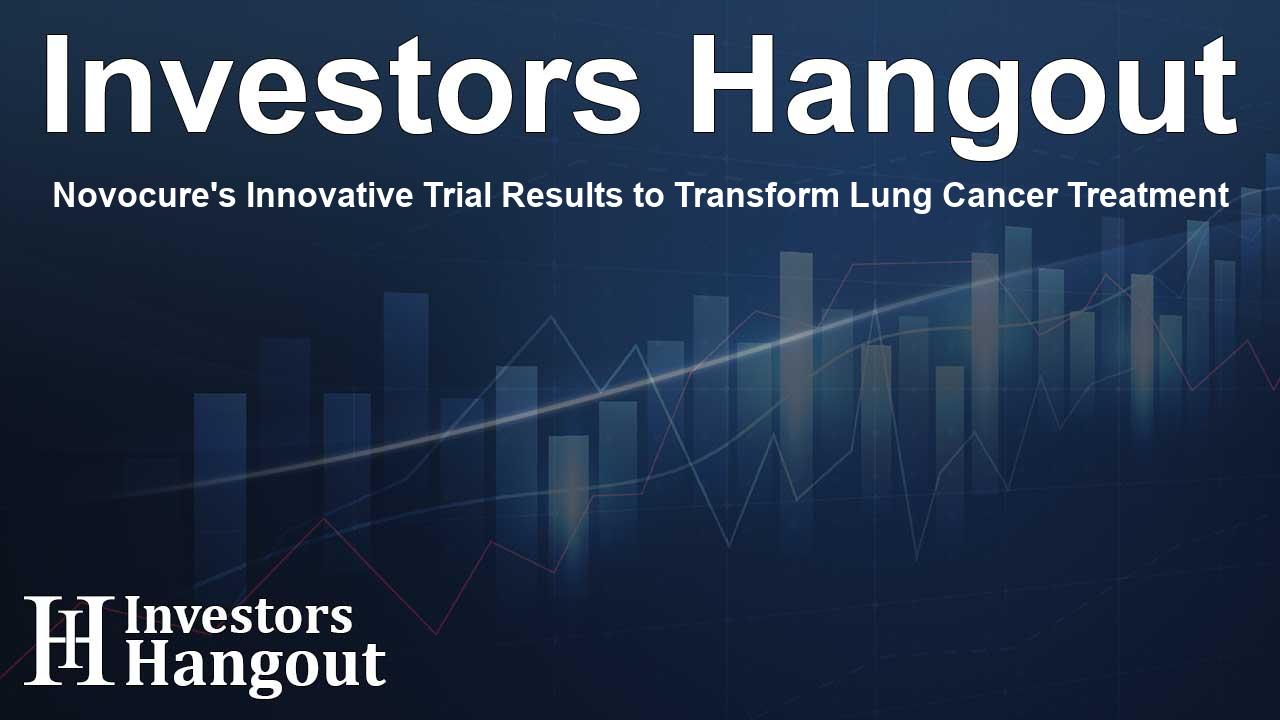Novocure's Innovative Trial Results to Transform Lung Cancer Treatment

Novocure Presents Groundbreaking METIS Trial Results
In an exciting development for brain metastases treatment, Novocure (NASDAQ: NVCR) has announced the final results of its pivotal Phase 3 METIS trial. This trial focused on the efficacy of Tumor Treating Fields (TTFields) therapy combined with best supportive care for patients with brain metastases stemming from non-small cell lung cancer (NSCLC). The results were presented during the American Society for Radiation Oncology (ASTRO) Annual Meeting.
Pivotal Findings from the METIS Trial
The primary endpoint of the METIS trial was to evaluate the time to intracranial progression in patients who received TTFields therapy along with supportive care compared to those who received supportive care alone. The findings revealed a statistically significant extension in the time before disease progression for those treated with TTFields.
Breaking New Ground in Lung Cancer Therapy
Dr. Vinai Gondi, Director of Radiation Oncology, expressed that the results from the METIS trial provide a vital new avenue for lung cancer patients with brain metastases, particularly as more systemic therapies enhance their longevity. This means there’s a critical demand for innovative therapies that can effectively manage brain metastases without compromising patients' overall quality of life.
Key Results and Implications
The trial involved 298 adults diagnosed with 1-10 brain metastases from NSCLC. Participants were randomized to receive TTFields therapy combined with best supportive care or best supportive care alone after undergoing stereotactic radiosurgery (SRS).
Statistical Highlights of the METIS Trial
When analyzing the results, it was observed that patients who received TTFields therapy had a 28% reduced risk of intracranial progression. The median time to progression for these patients was 15 months, compared to just 7.5 months for those in the control group. This difference is telling and underlines the potential of TTFields therapy as a pivotal treatment option.
Other Measures and Findings
Interestingly, while the trial showed improved outcomes regarding the delay in progression, secondary measures didn't indicate any significant differences in neurocognitive failure or overall survival rates between the two groups. However, the data does hint at improved outcomes for patients also receiving immune checkpoint inhibitors.
Safety and Quality of Life Considerations
The safety profile of TTFields was in line with previous results seen in other trials, with mild skin-related adverse events being the most commonly reported. Importantly, the trial noted no overall decline in quality of life for patients undergoing TTFields therapy, with many reporting better functioning levels in key health domains.
Future Directions for Novocure
With these promising results, Novocure is gearing up to submit a premarket approval application to the FDA for TTFields therapy aimed explicitly at adults battling brain metastases linked to NSCLC. This step could bring about significant changes in the therapeutic landscape for lung cancer.
The Broader Impact of Tumor Treating Fields
Tumor Treating Fields work by using electric fields to disrupt cancer cell division while sparing healthy cells, thanks to differing biological properties. This approach not only enhances traditional treatment modalities but can also be used alongside chemotherapy, radiotherapy, and immunotherapy.
About Novocure and its Ongoing Commitment to Innovation
Novocure is a pioneering oncology company dedicated to advancing treatments that can meaningfully extend life for patients with aggressive cancer types. Currently, its products are authorized in various countries for treating glioblastoma and NSCLC, among others. Moreover, ongoing trials aim to explore additional applications for their innovative TTFields technology.
Frequently Asked Questions
What are Tumor Treating Fields?
Tumor Treating Fields (TTFields) are electric fields that target cancer cells during division, effectively disrupting their growth while minimizing effects on healthy cells.
How did the METIS trial measure success?
Success in the METIS trial was measured primarily by assessing the time until patients experienced intracranial disease progression.
What were the main results of the METIS trial?
The METIS trial demonstrated a significant 28% reduction in the risk of intracranial progression for patients receiving TTFields therapy combined with best supportive care compared to those who received supportive care alone.
When was the METIS trial presented?
Results from the METIS trial were presented at the ASTRO Annual Meeting, underlining the significance of these findings in the oncology community.
What is the future for Novocure following the trial?
Following the METIS trial results, Novocure plans to submit a premarket approval application to the FDA for TTFields therapy to treat patients with brain metastases from NSCLC, potentially transforming treatment options.
About The Author
Contact Caleb Price privately here. Or send an email with ATTN: Caleb Price as the subject to contact@investorshangout.com.
About Investors Hangout
Investors Hangout is a leading online stock forum for financial discussion and learning, offering a wide range of free tools and resources. It draws in traders of all levels, who exchange market knowledge, investigate trading tactics, and keep an eye on industry developments in real time. Featuring financial articles, stock message boards, quotes, charts, company profiles, and live news updates. Through cooperative learning and a wealth of informational resources, it helps users from novices creating their first portfolios to experts honing their techniques. Join Investors Hangout today: https://investorshangout.com/
The content of this article is based on factual, publicly available information and does not represent legal, financial, or investment advice. Investors Hangout does not offer financial advice, and the author is not a licensed financial advisor. Consult a qualified advisor before making any financial or investment decisions based on this article. This article should not be considered advice to purchase, sell, or hold any securities or other investments. If any of the material provided here is inaccurate, please contact us for corrections.
